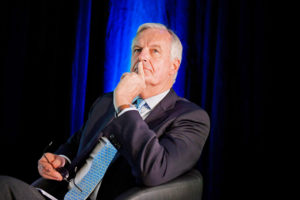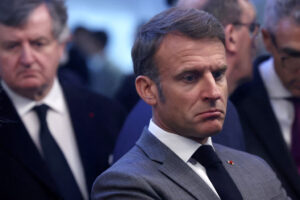Macron has faced relentless criticism for his decision to call a snap parliamentary election in July. Having said he wanted a “clarification” from the people after Le Pen’s National Rally (RN) surged to first place in the European Parliament elections, he lost his majority and gained a hung parliament. There followed two months of political deadlock which plunged France into chaos. It did indeed seem like the president’s petulant gamble had catastrophically backfired.
But in an astonishing twist on Thursday, the Élysée announced that it had finally settled on the name of the new prime minister. And it was a familiar one: Michel Barnier, the EU’s former chief Brexit negotiator. Macron had tasked him with forming “a unifying government in the service of the country”. On the face of it, this might seem like a long shot: Barnier is neither popular, nor even that well-known in France. His party, The Republicans, managed a mere 5% in the recent election. Having served four times as a government minister and twice as EU commissioner, Barnier, 73, long seen as a centrist, liberal-minded neo-Gaullist, is very much a representative of the establishment that voters have just rejected en masse. He’s known as the “French Joe Biden”. And yet this latest in a long line of political gambles for Macron may well prove to be a stroke of genius.
Only two months ago, Macron’s crushing defeat at the hands of Le Pen in the European elections had left him deeply delegitimised. He threw the dice and the subsequent French election succeeded in keeping Le Pen at bay — but in turn empowered a new Left-wing bloc comprising Jean-Luc Mélenchon’s left-populist party La France Insoumise, a sworn enemy of Macronisme. Macron was now squeezed between two foes on both Left and on the Right and institutional protocol, and basic democratic logic, dictated that he should appoint a prime minister from the New Popular Front — the coalition that won the most seats.
This would have spelled disaster for Macron: the New Popular Front vowed, among other things, to repeal Macron’s flagship, but very controversial, pension reform law that raised the retirement age from 62 to 64. To ward off this scenario, the Macroniste bloc and the French establishment performed a remarkable pivot. Having successfully engaged the Left’s support in setting up a “republican front” to defeat Le Pen, it then turned that logic against the Left itself. The “dangerous radicals” who needed to be kept out of power now were no longer those on the “far Right” — but those on the “far Left”. Macron’s party immediately ruled out working with Mélenchon’s.
And so when the New Popular Front finally put forward a prime ministerial candidate — the not-particularly-radical Lucie Castets, a 37-year-old civil servant — Macron released a statement announcing that he was not going to appoint a prime minister from the Left-wing coalition because that they would not be in a position to govern with stability. A shocking denial of democracy, perhaps, but utterly consistent with the French president’s increasingly repressive techno-authoritarian rule, and his longstanding practice of exploiting the Left against the Right to his own benefit, while offering nothing in exchange.
Even though many voices from the NFP condemned the decision as a “disgrace” and an “unacceptable power grab”, Macron was always going to do whatever it took to safeguard his economic reforms and keep the Left out of power. He would readily disregard basic democratic principles to shore up his position — and even, it turns out, strike a deal with Le Pen.
Enter Barnier. Perhaps an unlikely candidate to help broker a deal between the Macroniste bloc and the Eurosceptic National Rally. In his role as the EU’s chief Brexit negotiator, he garnered a reputation for being for a radical pro-EU ideologue, who seemed more intent on “punishing” the UK for daring to leave than attempting to carve out a mutually beneficial relationship. His insistence on the EU’s red lines, particularly around the integrity of the single market and the Irish border issue, were seen by Brexiteers as obstructing the UK’s ability to achieve a satisfactory deal, and sharply discouraging for other member states who might have been contemplating similar exits.
In recent years, however, Barnier has made a significant shift to the Right. During the 2022 campaign, as part of an unsuccessful attempt to become the presidential candidate against Macron, he assumed a hard anti-immigration line, claiming it was “out of control” and proposing a three-to-five-year moratorium on non-EU arrivals to France. He also said that France should regain its “legal sovereignty” and not be subject to the judgments of the EU courts. To many, this was little more than political opportunism: an attempt to whitewash his track record as an EU fanatic. His decision to prop up Macron, despite their short-lived rivalry, would appear to confirm this. Indeed, given his current positioning as a Right-leaning man of the establishment, he’s the perfect candidate for Macron’s latest political gamble: a de facto alliance between liberal-centrist forces and the National Rally against the Left.
While no official alliance is needed to approve the new prime minister — and Le Pen would of course never enter a formal agreement with Macron as it would amount to political suicide — the President wouldn’t have put forward Barnier’s name without having first squared it with Le Pen. He wouldn’t have risked the latter supporting a no-confidence motion against the proposed prime minister alongside the Left (which has already vowed to table a vote). Indeed, Le Pen has already signalled an openness to support the new government on individual policies. “Michel Barnier seems to meet at least the first criterion that we had requested, that is to say, someone who is respectful of the different political forces and capable of addressing the National Rally, which is the first party in the National Assembly”, she said.
It’s not hard to imagine what form the deal took: the new government will address some of the issues that National Rally considers priorities — first and foremost immigration — provided the RN doesn’t challenge Macron’s economic reforms and supports France’s Ukraine policy. There is no guarantee that the agreement holds, of course. But, it’s hard not to see this as a swingeing victory for Macron. In one fell swoop, he has marginalised the Left while absorbing the National Rally into the mainstream, forcing it to blunt its edges on economic and foreign policy issues — even potentially dampening support for the party, if it is seen as cosying up to the establishment. Not bad for someone who was considered politically dead just a few months ago.
Of course, it’s not a terrible outcome for Le Pen, who will be able to influence government policy on key issues. Given the pro-Macron bloc and the other centre-right parties don’t have an outright majority, Le Pen’s party holds a de facto veto over government policy. As one centrist lawmaker put it, Barnier’s fate will effectively “held by the National Rally”. And yet it’s hard not to see the establishment as the real winner here: in exchange for a compromise on immigration and security more broadly, Macron has succeeded in guaranteeing a degree of continuity to his agenda in terms of the overall direction of his economic and foreign policy — i.e., EU-dictated budgetary cuts and neoliberal structural reforms, and continued financial-military support for Ukraine under Nato’s banner.
This outcome was predicted back in 2018, when the French historian Emmanuel Todd put forward the concept of Macro-Lepenisme: a collusion between the forces of the state-financial aristocracy embodied by Macron and the authoritarianism implicitly associated with Le Pen’s political past. Todd suggested that even though Macron and Le Pen represent different ends of the political spectrum, their policies and actions actually revealed a deeper alignment. Both were seen by Todd as supporting a system that benefits the ruling class, particularly the wealthy and the powerful, at the expense of broader societal change. One of Todd’s central critiques is that both Macron and Le Pen exhibit authoritarian tendencies: for example, Le Pen expressed support for the French police’s often-brutal repression of the Gilets Jaunes protests. As this alliance comes into power, it is bound to have implications well beyond France.
In fact, this alliance between centrist-liberal and right-populist forces — a phenomenon that could be characterised as liberal-conservative populism — may soon become the blueprint for other European countries: stricter immigration policies and a cultural pushback against progressivism coupled with a relatively mainstream approach to economic and foreign policy within the EU-Nato framework. As said, one may view this as both a victory and a defeat for right-populism: a victory insofar as it will have succeeded in shifting policy in some areas, principally immigration and public safety; a defeat insofar as it will mean that right-populists will have failed to radically challenge the dominant economic-political order, and will have been reabsorbed into the establishment, as Le Pen in France.
The architecture of the EU itself plays a big role here: the degree of economic and financial control that Brussels exercises over member states, especially those that are part of the eurozone, means that even right-populist parties have little choice but to go along with the EU’s diktats. In this sense, Barnier’s cozy relationship with Brussels will likely be key, as he can be expected to work hand-in-hand with the EU on keeping France in line with the European agenda. It’s no coincidence that in his first statement he heralded a form of “green austerity” for France. As prime minister, people should expect him to “tell the truth, even if it’s difficult — the truth about debt, and the truth about environmental debt, which weighs heavy on the shoulders of our children”, he said.
But right-populist parties also share part of the responsibility: by framing the question of security almost exclusively in terms of stricter controls on immigration, rather than in broader terms of economic security, and refusing to recognise that the EU’s architecture sets structural impediments to real change, they are easy prey for co-option by the establishment. Macro-Lepenisme, it would appear, is here to stay.
Disclaimer
Some of the posts we share are controversial and we do not necessarily agree with them in the whole extend. Sometimes we agree with the content or part of it but we do not agree with the narration or language. Nevertheless we find them somehow interesting, valuable and/or informative or we share them, because we strongly believe in freedom of speech, free press and journalism. We strongly encourage you to have a critical approach to all the content, do your own research and analysis to build your own opinion.
We would be glad to have your feedback.
Source: UnHerd Read the original article here: https://unherd.com/



